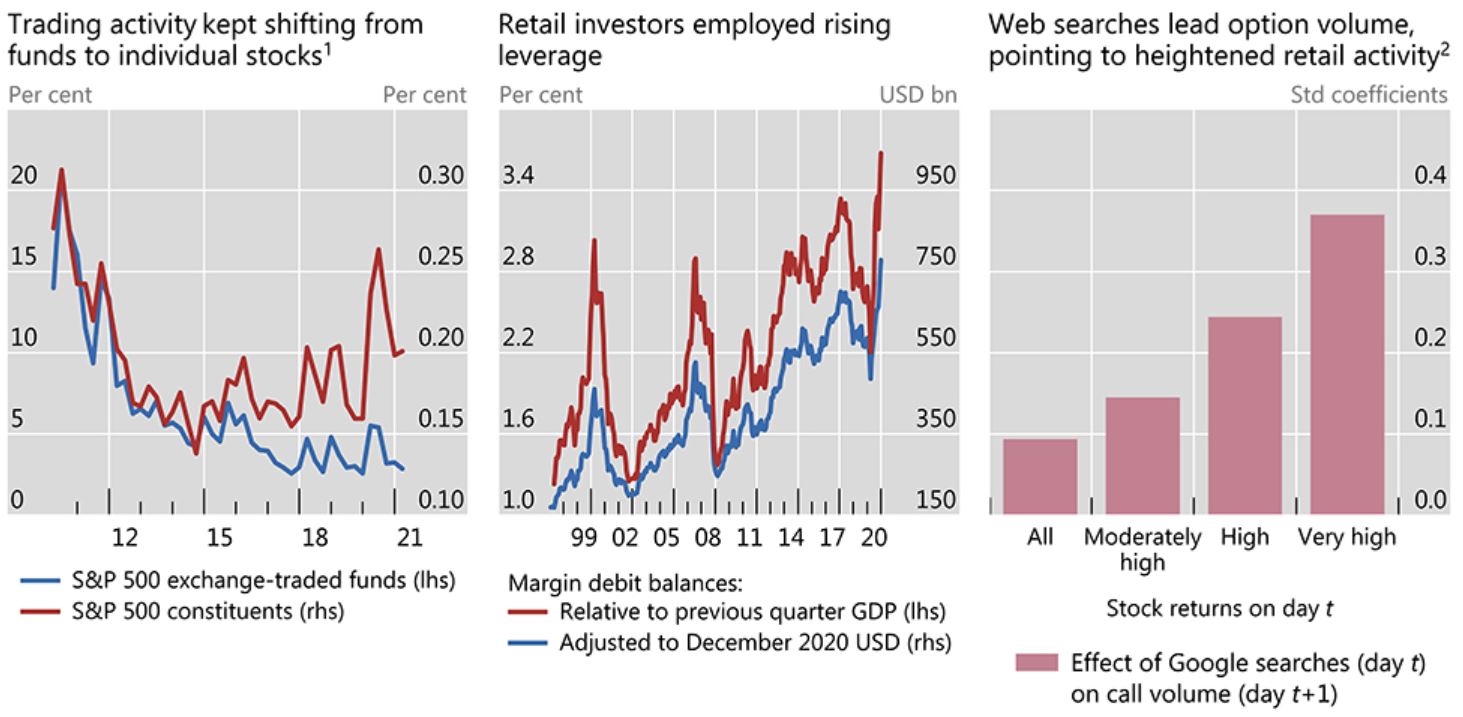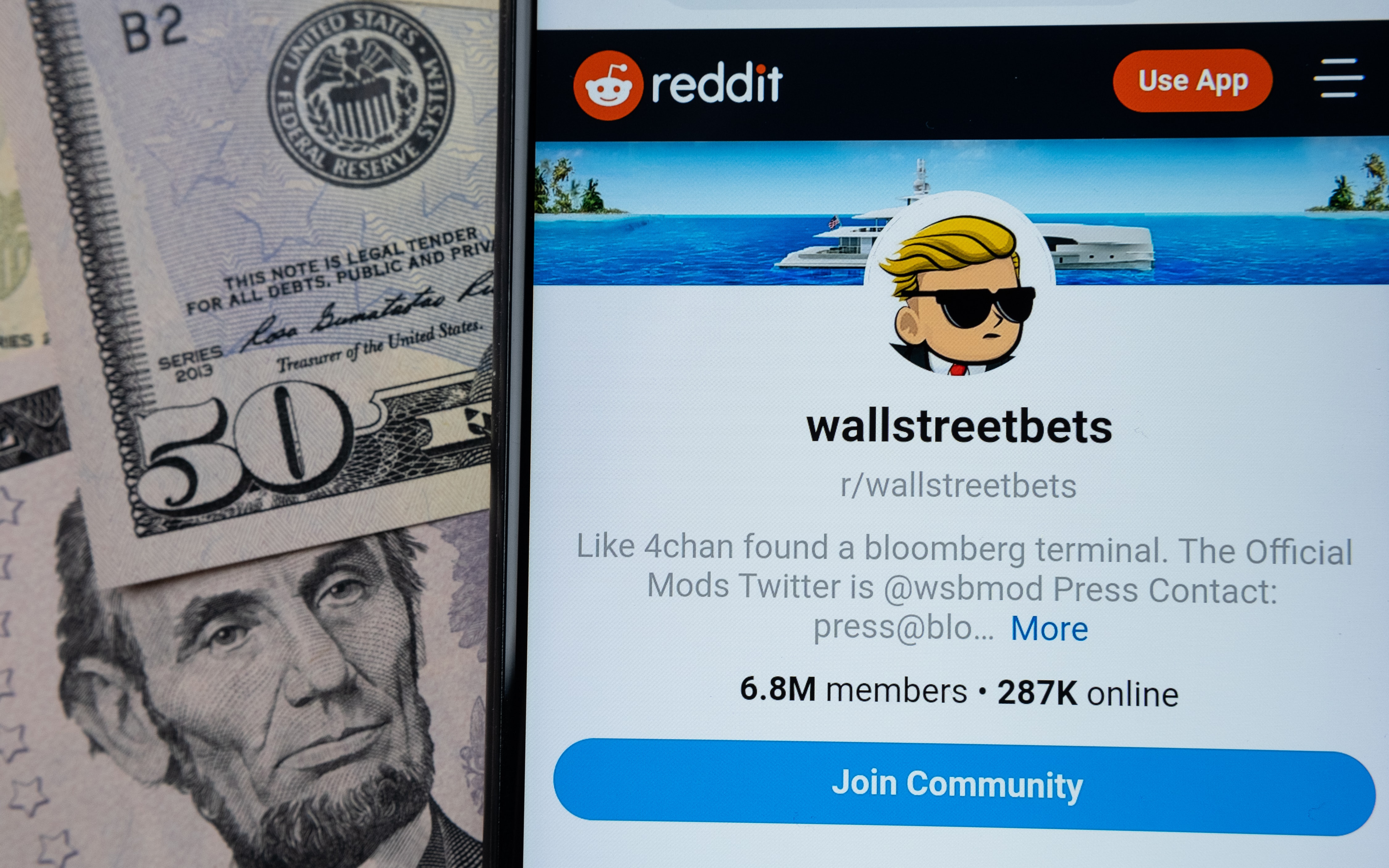The rise of retail investors – or the Robinhood effect – has been the biggest transformation in financial markets since the coronavirus pandemic sent shockwaves through the global economy in March 2020 with market access becoming increasingly democratised and social media providing a voice for this army of traders to connect through the internet.
There is no doubt the potential impact of retail investors is on the rise. According to data from Bloomberg Intelligence, retail investor trading volumes on US equities jumped above 20% in 2021, far ahead of hedge funds and mutual funds which accounted for 10% and 6%, respectively.
A further signal to the growing role of retail investors comes from the Bank for International Settlements (BIS) which found the amount of debt in US brokerage accounts – one of the main tools investors have to manage their assets – soared to $750bn in December 2020, the highest level on record since 2017, both in inflation-adjusted terms and as a share of GDP.
Chart 1: The influence of retail investors continued to increase

Source: Bank for International Settlements
The key driving force behind this phenomenon has been coronavirus with the unprecedented lockdown combined with the rapid sell-off in markets last March providing investors with the perfect opportunity to dip their toes into the US stock market.
Enabling this surge in trading has been the brokerage platforms such as Robinhood which saw an additional three million accounts created in Q1 2020 and currently boasts a total of 13 million users on its platform.
These brokerage platforms have democratised investing by enabling amateur traders to buy and sell shares for free with many areas of the market previously out of reach for this type of investor.
With the ability to access stocks now at their fingertips, retail investors started utilising this new-found power they had. Through the use of social media sites such as Reddit, investors discussed views on the market and began targeting certain stocks and assets.
As Oktay Kavrak, product strategy at Leverage Shares, said: “The gamification of trading and the added influence of social media has turned traders into speculators and riskseeking new entrants to gamblers.
“There is also an ideological element to it – ‘sticking it to the suits’ – where traders try to undermine the Wall Street by collectively pumping stocks with a high short interest.”
Video games retailer GameStop was the first target for this army of investors – a company that had been heavily shorted by Wall Street investors was seen as the perfect stock to strike back against big banks for their hand in the Global Financial Crisis. From the beginning of last December to the high on 27 January, the stock surged as much as 2,099% forcing short sellers to scurry from their positions.
Attempts were made on the silver market and other stocks such as AMC have reaped the benefits of moves made by WallStreetBets and the like to corner market but for investors jumping on the bandwagon late on, they are at risk of being caught in the social media hype.
“During the pandemic year of 2020 and 2021, retail investors have access to easy trading, more funding, and more information from social media platforms such as Reddit,” said Danqi Hu of Northwestern University and co-author of The Rise of Reddit: How Social Media Affects Retail Investors and Short-sellers’ Roles in Price Discovery.
Kavrak added: “The pandemic-led digital transformation has given birth to the modern retail investor. The army of new market participants is tech savvy, armed with the latest information and glued to social media. They can no longer be overlooked, now making up 20% of stock trading volume.”
So how are financial companies reacting? In the exchange-traded product (ETP) space, one recent development has been the launch of stock tracker ETPs that offer 1:1 exposure to well-known companies such as Amazon, Tesla and Baidu.
This is the further democratisation of investing as these ETPs are priced at $5 a share instead of the high prices of some stocks such as Amazon which is currently trading at $3,489.
“Fragmented markets in Europe mean investors still face barriers like FX fees and lack of fractional trading when buying their favourite stocks,” Kavrak concluded. “Our stock tracker ETPs remove yet another barrier in their financial journey to building wealth.”
This article first appeared inUnder The Spotlight: Single stock trading boomsin partnership with Leverage Shares





